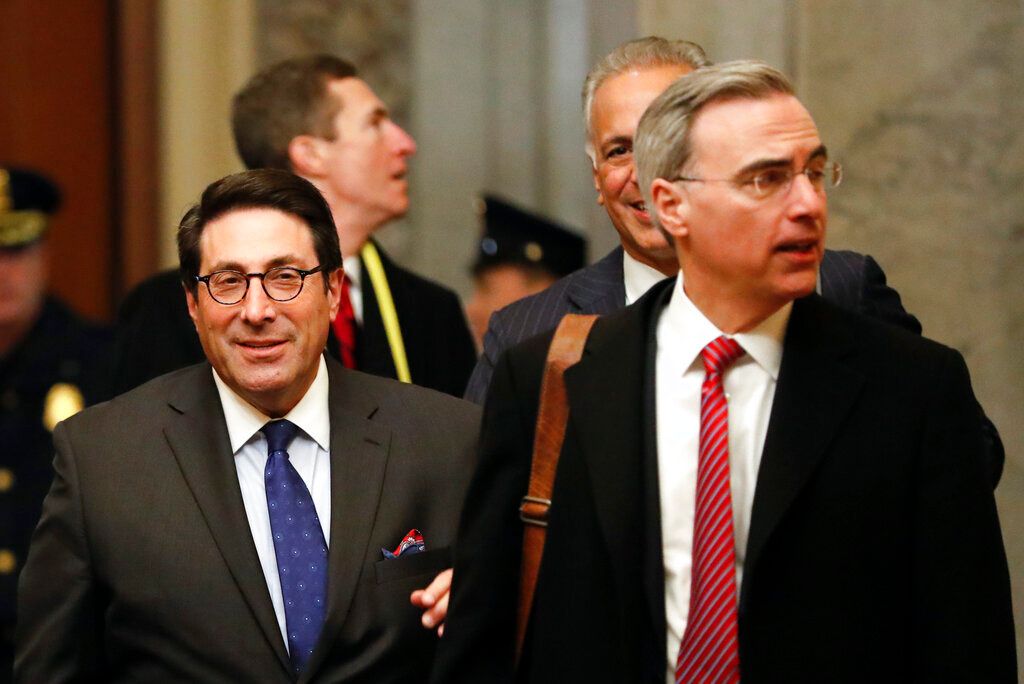Trump's Lawyers Should Be Ashamed of Themselves
The president's defense team opened the Senate impeachment trial by botching the facts and making pointless arguments.Going into the impeachment trial of President Donald Trump, I wondered how serious the defense would be. The answer — at least during the first hours of Day 1 — was that Trump's lawyers might as well have used random sound bites from a third-tier radio talk show host.
Harsh? Yes, and deservedly so.
How can anyone be less than harsh about an opening presentation in the Senate debate over trial procedures, from experienced attorneys like Jay Sekulow and Pat A. Cipollone, that repeatedly made basic factual errors? They told senators that Republican members of the House of Representatives were not allowed to attend House depositions taken during evidence-gathering leading up to the impeachment vote, but that's simply not true. Republican members of three committees were allowed to attend, did attend, and fully participated.
It would have been correct to say that Trump's lawyers were not allowed to attend those sessions and preliminary hearings, but instead the Senate was told that Trump's lawyers were not allowed to participate at all in the House. Again, untrue; they were invited to the Judiciary Committee's hearings and deliberations. Trump's lawyers also claimed that the House tried to unilaterally override claims of executive privilege by pressing for documents and witnesses. The truth is that the White House hasn't — still — invoked any privilege, but simply refused to cooperate.
That's not all. I wrote Tuesday morning that a good test of the seriousness of the defense was whether it rested on whether the lead impeachment manager, House Intelligence Committee Chair Adam Schiff, paraphrased rather than quoted the notorious Trump phone call of July 25, 2019 with Ukrainian President Volodymyr Zelenskiy, and guess what: That showed up right away. Indeed, Trump's lawyers told the Senate falsely that Schiff claimed to be reading the call record, when in fact Schiff clearly said at the time that he wasn't reading it word for word. It was in that call that Trump asked Zelenskiy to investigate Democratic presidential candidate Joe Biden, a request that is now at the heart of the first of the two articles of impeachment.
All of that was beside the point, which was whether to adopt procedures offered up by the Senate Republican leader, Mitch McConnell. The president's lawyers didn't talk about that much. But they did claim, twice, on the question of calling witnesses, that any lawyer who showed up in a normal court proceeding and asked for more information would be thrown out of court and sanctioned by the judge. That was hardly a convincing argument; nor was the claim that the House managers wanted more information only because they weren't ready. Schiff found that easy to knock down: He called for the testimony of two key Trump aides, former National Security Adviser John Bolton and Chief of Staff Mick Mulvaney, and said that the House was ready to question them right away. Moreover, as Schiff said, any court that prohibited witnesses from being called and documents produced would itself be sanctioned.
And on and on. The crazy thing is that this was all in the context of adopting procedural rules for which the president's team had perfectly reasonable arguments available. After all, while McConnell didn't entirely follow the rules put in place in 1999 for the impeachment trial of President Bill Clinton, the basic structure is similar, and Trump's lawyers could have simply argued that what was good enough for Clinton was good enough for Trump.
(The House response is that the circumstances are sufficiently different that the same rules would create a different situation. That, too, is a reasonable argument. The House did spend plenty of time making that case. Trump's lawyers at best mentioned their strong argument in passing).
Only a few hours into the trial, it appears that the president's team is mainly focused on appealing to its client, rather than making arguments that might sway senators. Or it's thinking of the opening arguments as an audition for slots on Fox News, rather than as a serious constitutional matter.
Or even worse: It's possible that these lawyers don't know the difference. As Greg Sargent of the Washington Post suggests: "Trump's team has spent so many months giving fake, Fox-News-friendly defenses of Trump that they forgot that in the real world, the facts and evidence arrayed against Trump are incredibly damning."
To be sure, nobody knows whether any argument or evidence will have any effect on Republican senators. Nobody knows whether it will have any effect on public opinion. But it's unlikely that it's helping Trump, at least compared to what a strong defense might do.
One significant advantage the president has in a Senate impeachment trial is that the prosecution team is limited in personnel to members of the House, while the president can put together an all-star team of any lawyers in the nation. During Clinton's trial, the general sense of most observers was that Clinton's team was significantly superior to the House managers.
I don't think anyone other than solid Republican partisans are going to think that this time.
Jonathan Bernstein, Bloomberg, January 21, 2020
###
January 25, 2020
Voices4America Post Script. Today until Tuesday, expect to hear a "defense" that doesn't address the facts of what Trump did. We need #Witnesses and #Documents and a president who serves the nation, not just himself. Keep calling your Senators! #RemoveTrumpNow
Fight back. In less than 12 hours resisters sent over 10,000 letters to senators demanding to see documents and witnesses in Trump's removal trial. Text "remove trump" to 50409 to send your senators each a letter right now! Pass it along! #TrumpIsGuilty
